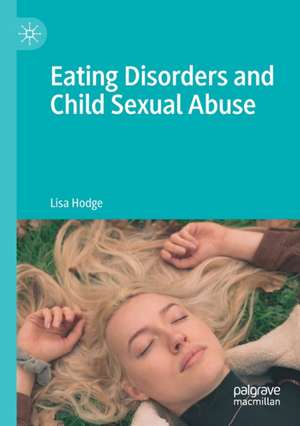Eating Disorders and Child Sexual Abuse
Autor Lisa Hodgeen Limba Engleză Paperback – 12 mar 2022
| Toate formatele și edițiile | Preț | Express |
|---|---|---|
| Paperback (1) | 650.08 lei 6-8 săpt. | |
| Springer Nature Singapore – 12 mar 2022 | 650.08 lei 6-8 săpt. | |
| Hardback (1) | 656.08 lei 6-8 săpt. | |
| Springer Nature Singapore – 11 mar 2021 | 656.08 lei 6-8 săpt. |
Preț: 650.08 lei
Preț vechi: 684.30 lei
-5% Nou
Puncte Express: 975
Preț estimativ în valută:
124.39€ • 130.22$ • 102.93£
124.39€ • 130.22$ • 102.93£
Carte tipărită la comandă
Livrare economică 05-19 aprilie
Preluare comenzi: 021 569.72.76
Specificații
ISBN-13: 9789813362987
ISBN-10: 9813362987
Pagini: 280
Ilustrații: XI, 280 p. 11 illus., 3 illus. in color.
Dimensiuni: 148 x 210 mm
Greutate: 0.35 kg
Ediția:1st ed. 2021
Editura: Springer Nature Singapore
Colecția Palgrave Macmillan
Locul publicării:Singapore, Singapore
ISBN-10: 9813362987
Pagini: 280
Ilustrații: XI, 280 p. 11 illus., 3 illus. in color.
Dimensiuni: 148 x 210 mm
Greutate: 0.35 kg
Ediția:1st ed. 2021
Editura: Springer Nature Singapore
Colecția Palgrave Macmillan
Locul publicării:Singapore, Singapore
Cuprins
Part I. Examining Child Sexual Abuse and Eating Disorders.- 1. Capturing the Research Journey: An Introduction.- 2. A Story of Language, Meaning and Power.- Part II. The Women’s Stories.- 3. The Female Body as a Site of Opposition.- 4. Masking the Self.- 5. Cleanliness and Purification.- 6. Beauty Politics in Eating Disorders.- 7. Situating Silence in Child Sexual Abuse.- 8. Conclusion: Beyond Illness and Pathology.
Notă biografică
Lisa Hodge PhD, is a research fellow in the Institute for Health and Sport at Victoria University, Australia
Textul de pe ultima copertă
‘The architectural design of the thinking that underpins this exploration of the relationship between child sexual abuse and eating disorders is superb. Hodge draws on Bakhtin, feminist dialogics and the creative arts to produce an imaginative analysis of women’s experiences and accordingly offers a convincing and novel contribution to the field. Undoubtedly this is a methodological masterpiece and a great leap for social work research!’
—Professor Charlotte Williams OBE, RMIT University, Australia
‘A very well researched and timely book, published when the “me too movement” has brought hidden stories of sexual abuse out of the shadows into public awareness. It should become required reading for training courses for professionals to work directly with women who present with this history. The book clearly portrays the essential principles and strengths of its qualitative methodology, pivoting as it does on phenomenological consciousness, emphasising that the book is about the lived experience of the women themselves. It is their story, about their food related behaviour, which is examined as psychological consequence of sexual abuse, rather than adopting the generic “eating disorders” approach. This gives a powerful account.’
—Dr Maye Taylor, Psychotherapist and previously the MSc Academic Course Leader, Manchester Metropolitan University, United Kingdom
‘This vitally important book privileges women’s voices in how they make sense of their own experiences of the connections between “eating disorders” and child sexual abuse, elucidating how women with eating disorders often use their bodies as a form of resistance to express silenced traumas. The book is mandatory reading for anyone who seeks to move beyond the pathologising understandings that currently dominate the field. The depth of critical analysis offered by Lisa Hodge delivers gold star scholarshipthat points to innovative and creative ways to understand and respond to this important social issue.’
—Professor Christine Morley, Queensland University of Technology, Australia
Caracteristici
Situated in social work, complemented by gender studies, cultural studies, psychology and sociology, this multidisciplinary text draws on a bedrock of theory, ranging from sociology of the body, socio-cultural theory, and humanities, and is situated under the banners of post-structuralism and feminism Poems, as examples of creative writing, and visual images in the form of drawings, comprise a unique and powerful core of the data presented Challenges common explanations for eating disorders as a reaction to dominant explanations of beauty
